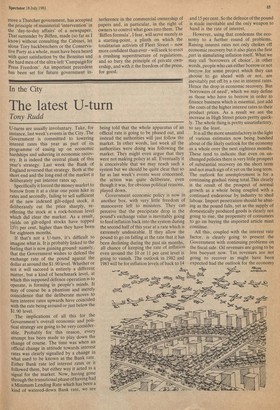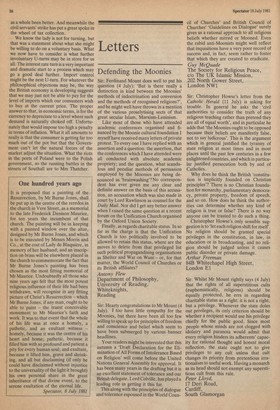In the City
The latest U-turn
Tony Rudd
U-turns are usually involuntary. Take, for instance, last week's events in the City. The Government is committed to lowering interest rates this year as part of its programme of easing up on economic hardships and ushering in economic recovery. It is indeed the central plank of this year's strategy. Last week the Bank of England reversed that strategy. Both at the short end and the long end of the market it deliberately put interest rates up.
Specifically it forced the money market to borrow from it at a clear one point hike in rates and secondly, failing to sell sufficient of the new indexed gilt-edged stock, it deliberately cut the price sharply, reoffering the stock at a rock-bottom level which did clear the market. As a result, yields on gilt-edged stocks have topped 151/2 per cent, higher than they have been for eighteen months.
If that's not a U-turn, it's difficult to imagine what is. It is probably linked to the feeling that is now gaining ground: namely, that the Government wishes to defend the exchange rate of the pound against the dollar at around the $1.90 level. Whether or not it will succeed is entirely a different matter, but a kind of benchmark level, at which this supposed defence operation is to operate, is forming in people's minds. It may of course be a phantom and merely coincidence that the deliberate moves to turn interest rates upwards have coincided with the rate being around or just below the $1.90 level.
The implications of all this for the Government's overall economic and political strategy are going to be very considerable. Probably for this reason, every attempt has been made to play down the change of course. The time was when an official change in attitude towards interest rates was clearly signalled by a change in what used to be known as the Bank rate. Either Bank rate led interest rates or it followed them, but either way it acted as a Signal for the market. Now, having gone through the transitional phase of having had a Minimum Lending Rate which has been a kind of watered-down Bank rate, we are being told that the whole apparatus of an official rate is going to be phased out, and instead the authorities will just follow the market. In other words, last week all the authorities were doing was following the market. They might even argue that they were not making policy at all. Eventually it is conceivable that we may reach such a system but we should be quite clear that so far as last week's events were concerned, the action was quite deliberate, even though it was, for obvious political reasons, played down.
Government economic policy is now in another box, with very little freedom of manoeuvre left to ministers. They can perceive that the precipitate drop in the pound's exchange value is inevitably going to feed inflation back into the system during the second half of this year at a rate which is extremely undesirable. If they allow the pound to go on falling at the rate that it has been declining during the past six months, all chance of keeping the rate of inflation even around the 10 or 11 per cent level is going to vanish. The outlook in 1982 and 1983 will be for inflation levels of back to 14 and 15 per cent. So the defence of the pound is made inevitable and the only weapon to hand is the rate of interest.
However, using that condemns the economy to a further round of problems. Raising interest rates not only chokes off economic recovery but it also plays the first part in stimulating inflation itself. What we may call 'borrowers of choice', in other words, people who can either borrow or not borrow for some project which they can choose to go ahead with or not, are inevitably put off by a rise in interest rates. Hence the drop in economic recovery. But 'borrowers of need', which we may define as those who have to borrow in order to finance business which is essential, just add the costs of the higher interest rates to their product prices. As a result we see the increase in High Street prices pretty quickly. The whole thing is pretty unsatisfactory, to say the least.
It is all the more unsatisfactory in the light of various estimates now being bandied about of the likely outlook for the economy as a whole over the next eighteen months. These tend to indicate that even on unchanged policies there is very little prospect of substantial recovery on the short term and not much sign of it yet on the long term. The outlook for unemployment is for a continuing gradual rising total.This clearly is the result of the prospect of normal growth as a whole being coupled with a continued endeavour by industry to shed labour. Import penetration should be abating as the pound falls, yet as the supply of domestically produced goods is clearly not going to rise, the propensity of consumers to go on buying the imported article must continue.
All this, coupled with the interest rate factor, is clearly going to present the Government with continuing problems on the fiscal side. Oil revenues are going to be less buoyant now. Tax revenues are not going to recover as might have been expected had the outlook for the economy as a whole been better. And meanwhile the civil servants' strike has put a great spoke in the wheel of tax collection.
We know the lady is not for turning, but that was a statement about what she might be willing to do on a voluntary basis. What we now have to consider is what further involuntary U-turns may be in store for us all. The interest rate turn is a very important and dramatic start to a process which may go a good deal further. Import control might be the next U-turn. For whatever the philosophical objections may be, the way the British economy is developing suggests that we may just not be able to pay for the level of imports which our consumers wish to buy at the current price. The proper answer to that, in economic terms, is for the currency to depreciate to a level where such demand is naturally choked off. Unfortunately that would impose too high a penalty in terms of inflation. What it all amounts to really is that the consumer is getting far too much out of the pot but that the Government can't let the natural forces of the market adjust the situation. What the riots in the ports of Poland were to the Polish government, so the running battles in the streets of Southall are to Mrs Thatcher.



































 Previous page
Previous page